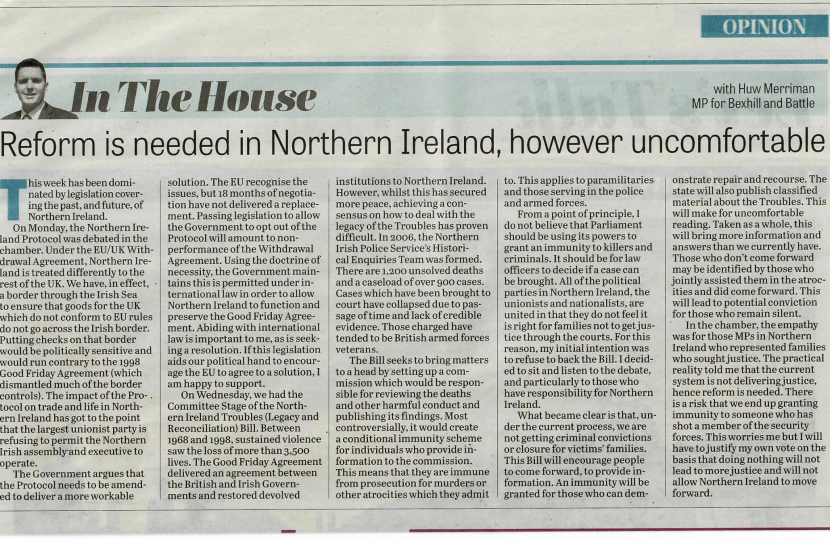
This week has been dominated by legislation covering the past, and future, of Northern Ireland.
On Monday, the Northern Ireland Protocol was debated in the chamber. Under the EU/UK Withdrawal Agreement, Northern Ireland is treated differently to the rest of the UK. We have, in effect, a border through the Irish Sea to ensure that goods for the UK which do not conform to EU rules do not go across the Irish border. Putting checks on that border would be politically sensitive and would run contrary to the 1998 Good Friday Agreement (which dismantled much of the border controls). The impact of the Protocol on trade and life in Northern Ireland has got to the point that the largest unionist party is refusing to permit the Northern Irish assembly and executive to operate.
The Government argues that the Protocol needs to be amended to deliver a more workable solution. The EU recognise the issues, but 18 months of negotiation have not delivered a replacement. Passing legislation to allow the Government to opt out of the Protocol will amount to non-performance of the Withdrawal Agreement. Using the doctrine of necessity, the Government maintains this is permitted under international law in order to allow Northern Ireland to function and preserve the Good Friday Agreement. Abiding with international law is important to me, as is seeking a resolution. If this legislation aids our political hand to encourage the EU to agree to a solution, I am happy to support.
On Wednesday, we had the Committee Stage of the Northern Ireland Troubles (Legacy and Reconciliation) Bill. Between 1968 and 1998, sustained violence saw the loss of more than 3,500 lives. The Good Friday Agreement delivered an agreement between the British and Irish Governments and restored devolved institutions to Northern Ireland. However, whilst this has secured more peace, achieving a consensus on how to deal with the legacy of the Troubles has proven difficult. In 2006, the Northern Irish Police Service’s Historical Enquiries Team was formed. There are 1,200 unsolved deaths and a caseload of over 900 cases. Cases which have been brought to court have collapsed due to passage of time and lack of credible evidence. Those charged have tended to be British armed forces veterans.
The Bill seeks to bring matters to a head by setting up a commission which would be responsible for reviewing the deaths and other harmful conduct and publishing its findings. Most controversially, it would create a conditional immunity scheme for individuals who provide information to the commission. This means that they are immune from prosecution for murders or other atrocities which they admit to. This applies to paramilitaries and those serving in the police and armed forces.
From a point of principle, I do not believe that Parliament should be using its powers to grant an immunity to killers and criminals. It should be for law officers to decide if a case can be brought. All of the political parties in Northern Ireland, the unionists and nationalists, are united in that they do not feel it is right for families not to get justice through the courts. For this reason, my initial intention was to refuse to back the Bill. I decided to sit and listen to the debate, and particularly to those who have responsibility for Northern Ireland.
What became clear is that, under the current process, we are not getting criminal convictions or closure for victims’ families. This Bill will encourage people to come forward, to provide information. An immunity will be granted for those who can demonstrate repair and recourse. The state will also publish classified material about the Troubles. This will make for uncomfortable reading. Taken as a whole, this will bring more information and answers than we currently have. Those who don’t come forward may be identified by those who jointly assisted them in the atrocities and did come forward. This will lead to potential conviction for those who remain silent.
In the chamber, the empathy was for those MPs in Northern Ireland who represented families who sought justice. The practical reality told me that the current system is not delivering justice, hence reform is needed. There is a risk that we end up granting immunity to someone who has shot a member of the security forces. This worries me but I will have to justify my own vote on the basis that doing nothing will not lead to more justice and will not allow Northern Ireland to move forward.



